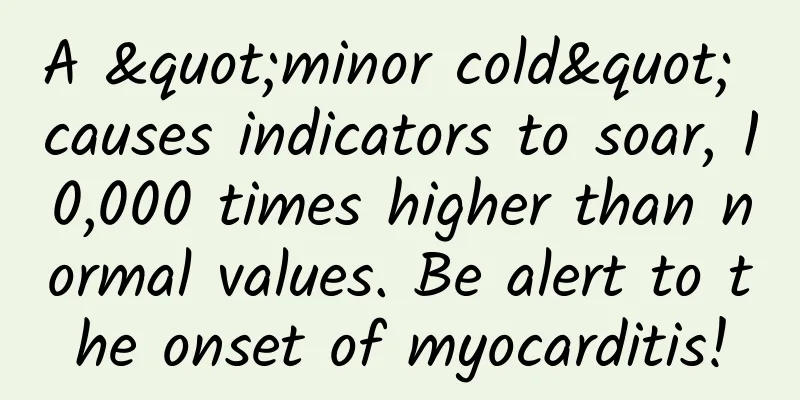A "minor cold" causes indicators to soar, 10,000 times higher than normal values. Be alert to the onset of myocarditis!

|
Recently, a girl in Guangdong had persistent coughing symptoms. She thought it was a common cold, but it didn't get better. She went to the hospital for a checkup and was diagnosed with myocarditis, with indicators 10,000 times higher than normal. After a month of treatment, she was out of danger, but left with sequelae and needed to take medication for life. This case reminds us that seemingly common cold symptoms may hide serious health problems. At the same time, a study published in the journal Circulation analyzed more than 56,000 hospitalized COVID-19 patients in 23 hospitals in Europe and the United States and found that 2.4 out of every 1,000 people clearly/probably developed acute myocarditis. The study mentioned that the most common symptoms of these patients with acute myocarditis were chest pain and dyspnea, and some patients did not develop related pneumonia. This study emphasizes that myocarditis is a complication that needs to be vigilant in viral infections. Similarities and differences between colds and myocarditis Colds are generally caused by respiratory viruses, such as influenza virus, adenovirus, etc. These viruses not only cause upper respiratory tract symptoms, but may also invade the blood and attack myocardial cells, thus causing myocarditis. Myocarditis can be chronic, acute or fulminant, of which fulminant myocarditis is the most serious, with an acute onset, rapid progression and a high mortality rate. The initial symptoms of fulminant myocarditis are similar to those of the common cold, including body aches, runny nose, headache, fever, etc., but heart failure or severe arrhythmias quickly develop afterwards. In addition, it may also be accompanied by multiple organ failures such as lung, liver, and kidney. The prognosis of fulminant myocarditis is related to many factors, including the patient's clinical manifestations, multiple clinical parameters, and endomyocardial biopsy results. Don't treat myocarditis as a common cold Cold symptoms: usually include cough, runny nose, sore throat, fever, etc. Symptoms of myocarditis: In addition to cold symptoms, you may also experience palpitations, chest tightness, chest pain, shortness of breath after activity, difficulty breathing, fatigue, etc. Severe myocarditis may cause sudden fainting and refractory shock. Who are the susceptible groups? 1. Young and middle-aged people: Although myocarditis can occur at any age, studies have shown that young and middle-aged people, especially those aged 16 to 30, are more susceptible to fulminant myocarditis. This group of people are usually highly active and have frequent social contacts, which increases the chance of viral infection. At the same time, young and middle-aged people often ignore minor physical discomfort and delay seeking medical treatment, which may aggravate the development of myocarditis. 2. People with impaired immune systems: People with impaired immune systems, such as cancer patients who have undergone chemotherapy or radiotherapy, have their immune system functions suppressed and are unable to effectively resist viral infections. In addition, patients with autoimmune diseases (such as systemic lupus erythematosus and rheumatoid arthritis) are also at high risk. 3. Patients with chronic diseases: People with chronic diseases such as diabetes, hypertension and cardiovascular diseases have poor underlying health conditions, their hearts are less resistant to viral infections and are more susceptible to myocarditis. 4. Pregnant women: Pregnant women have an increased cardiac burden and their immune system changes during pregnancy. At the same time, myocarditis during pregnancy not only affects the health of pregnant women, but also has adverse effects on the fetus. 5. Elderly people: As they age, their immune systems gradually weaken and they often have multiple chronic diseases. At the same time, they may not be as sensitive to symptoms, leading to delayed treatment. The treatment of myocarditis mainly relies on supportive therapy and the self-repair of the immune system. If symptoms of suspected myocarditis occur, you should seek medical attention immediately. Treatment measures include: Rest: adequate rest helps the myocardium recover; Drug treatment: use of antiviral drugs, immunosuppressants, etc. Nutritional support: Maintain good nutritional status and support physical recovery; Monitoring and follow-up: Regular electrocardiogram, cardiac ultrasound and other examinations are performed to monitor heart function. In summary, although colds and myocarditis have similarities, the severity and danger of myocarditis are much higher than the common cold. Understanding the difference between the two and identifying the early signs of myocarditis in time are of great significance for prevention and treatment. |
<<: Fan-shaped ears, long nose, what you see is just my appearance
>>: Real-time "error correction" for quantum computers! Why don't you go to space, AI?
Recommend
Your level of social anxiety may be related to this gene | Expo Daily
Your level of social anxiety may be related to th...
In the "backyard" of the Milky Way, is there a cosmic "spider" with a terrifying appearance?
The Milky Way's Iron Neighbor! Is It Actually...
The efficacy and function of Mirabilis jalapa root
Mirabilis jalapa root is a common Chinese medicin...
What are the effects and precautions of tiger skin plaster?
Plasters have always been one of the most essenti...
What are the medicinal values of angelica
With the continuous improvement of living standar...
Sabre Holdings: Total revenue for Q4 2014 is expected to be US$639-654 million.
TPG and Silver Lake Partners, major investors in ...
How does a frog's slippery tongue catch a fly?
When it comes to frog hunting, the following scen...
The efficacy and function of Suberobacteria
Suberioscillois is a Chinese medicinal material w...
The efficacy and function of banana seeds
Traditional Chinese medicine often has unexpected...
The efficacy and function of golden kidney
Golden kidney is a very good medicinal material. ...
A self-help guide for visiting relatives during the Spring Festival
Mixed Knowledge Specially designed to cure confus...
Blizzard, heavy rain! A new cold front is coming! Don't rush to take off your thick clothes, it is important to keep warm
This morning, except for some areas in the northe...
The efficacy and function of sheep dung fruit
Diseases require improvement through medicine. Di...
Do cats and dogs really get jealous?
© PoC – Cat Welfare at Heart Leviathan Press: Giv...









